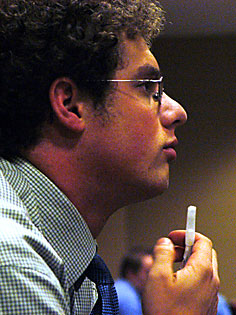 |
|
DANIELLE MALOTT/Arizona Daily Wildcat
|
Political science junior Sam Catanese looks on during a speech at the Greek life symposium about hazing last night in the Student Union Memorial Center.
|
|
By Cara O'Connor
Arizona Daily Wildcat
Wednesday February 26, 2002
More than 300 members of the UA greek community focused their attention on hazing and alcohol abuse prevention last night, as they gathered to hear Risk Management and hazing specialist Dr. Ron Binder speak at the New Member Symposium.
"It is a wonderful thing: getting it out in the open. People think it hurts, but it helps," said Jake Joyce, president of Sigma Nu fraternity.
With events such as bid nights, initiations, big brother and big sister nights, formals, mixers and 21st birthday celebrations, the risks associated with alcohol abuse and hazing in the greek system are high, Binder said.
He added that fraternities and sororities are the sixth-least insurable entities in the nation; bars are the first and liquor stores are the second.
"More students are getting seriously injured or killed in greek activities," Binder said.
However, the UA greek community is working to solve its problems with hazing and alcohol abuse by educating its members and strictly enforcing policies, said Panhellenic Association President Lauren Dean.
Education is helping to alleviate hazing problems on the UA campus, said Clint Walls, Interfraternity Council vice president of public relations.
"I think hazing is becoming less of an issue," he said. "New members know that there is action they can take."
The university has a hazing hotline that can be used to anonymously report hazing activities.
Anonymous reports to the hotline led to investigations of Sigma Chi and Delta Tau Delta fraternities earlier this semester; both are now on disciplinary probation.
"Hazing has always been a problem," Joyce said. "I'm not saying it will disappear tomorrow, but we are working to improve it."
However, working to change longstanding initiation and hazing traditions is sometimes easier said than done.
"Everyone looks at tradition, and everyone wants to do things how they were done in the past," Dean said.
At the symposium, the Interfraternity Council and Panhellenic Association emphasized to new members that greek organizations face serious disciplinary actions if they violate rules.
Commander Brian Seastone of the UA Police Department, the Greek Judicial Board, Greeks Advocating the Mature Management of Alcohol and Associate Dean of Students Alexis Hernandez all spoke about disciplinary issues and policies.
By violating policy, fraternities and sororities also face the possibility of costly lawsuits, Binder said.
The majority of all hazing incidents, sexual assaults, serious injuries and falls from rooftops involves alcohol, Binder said. He added that 85 percent of all lawsuits filed against fraternities and sororities involve alcohol abuse.
"Alcohol is a key issue," Walls said.
Binge drinking is also a problem for many college students, but it has the potential to especially affect greeks and athletes, Binder said, adding that 45 percent of non-greek students are binge drinkers, while 75 percent of athletes and greeks admit to binge drinking.
By definition, a binge drinker is someone who has consumed more than five drinks in one night within the previous two months.
To prevent potential problems from occurring, UA greek organizations are required to give risk management presentations to their members every semester and adhere to GAMMA and university policies. Policy violations are investigated and strictly punished by the Greek Judicial Board and the Dean of Students office, officials said.

